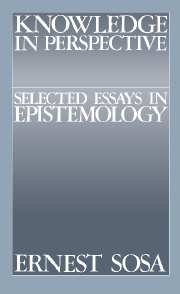Book contents
- Frontmatter
- Contents
- Sources and acknowledgments
- Introduction: back to basics
- PART I WHAT IS KNOWLEDGE, AND HOW IS IT POSSIBLE?
- PART II THEORIES OF JUSTIFICATION
- PART III INTELLECTUAL VIRTUE AND EPISTEMIC PERSPECTIVE: A VIEW PRESENTED
- PART IV INTELLECTUAL VIRTUE IN PERSPECTIVE: THE VIEW DEVELOPED
- 13 Knowledge and intellectual virtue
- 14 Methodology and apt belief
- 15 Equilibrium in coherence?
- 16 Intellectual virtue in perspective
- Index
16 - Intellectual virtue in perspective
Published online by Cambridge University Press: 08 January 2010
- Frontmatter
- Contents
- Sources and acknowledgments
- Introduction: back to basics
- PART I WHAT IS KNOWLEDGE, AND HOW IS IT POSSIBLE?
- PART II THEORIES OF JUSTIFICATION
- PART III INTELLECTUAL VIRTUE AND EPISTEMIC PERSPECTIVE: A VIEW PRESENTED
- PART IV INTELLECTUAL VIRTUE IN PERSPECTIVE: THE VIEW DEVELOPED
- 13 Knowledge and intellectual virtue
- 14 Methodology and apt belief
- 15 Equilibrium in coherence?
- 16 Intellectual virtue in perspective
- Index
Summary
INTELLECTUAL VIRTUES
Intellectual virtues might be viewed as ways of coping that are cognitively effective, a view however that would invite the question of just what might make a way of coping “cognitively effective.” According to my dictionary, “cognition” means “the act or process of knowing … also: a product of this act.” As for “effective,” it is said to mean “producing or capable of producing a result,” with an emphasis on “the actual production of or the power to produce an effect <effective thinking>.” Putting all this together, what makes a way of coping “cognitively effective” is its power to produce effects relating to or involving knowledge. But now look where that leaves us:
What is “knowledge”? True belief that is at least justified.
And what makes a true belief “justified”? That it have its source in intellectual virtue.
And what is “intellectual virtue”? A skill or ability that enables one to cope in a cognitively effective way.
And what makes a way of coping “cognitively effective”? That it have the power to produce effects relating to or involving knowledge.
Thus we start with knowledge and return to it in a narrow circle.
For a more illuminating account we need to escape the circle.
- Type
- Chapter
- Information
- Knowledge in PerspectiveSelected Essays in Epistemology, pp. 270 - 294Publisher: Cambridge University PressPrint publication year: 1991
- 12
- Cited by



